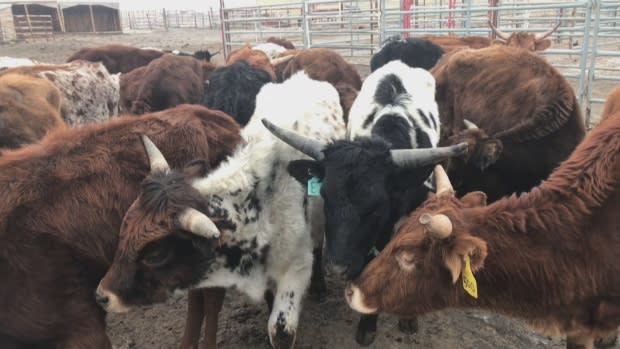Blood Tribe members to vote on historic $150M cattle mismanagement settlement from Ottawa

Members of the Blood Tribe in southern Alberta will vote Monday on whether to ratify a $150-million settlement with the federal government over concerns the federal government mismanaged the First Nation's burgeoning cattle industry 125 years ago.
The ratification vote will be held from 9 a.m. to 8 p.m. with polling locations in Standoff and in Calgary.
All members 21 and up are eligible to vote. Mail-in ballots are also being accepted.
If the majority votes in favour of the settlement, each band member will receive $2,000 and the remainder of the funds will be used on capital projects like a community college, a hockey rink, much needed multi-family housing and a treatment facility. The funds will be put into a trust, and interest will also be distributed to members on a yearly basis.
The settlement would see the Blood Tribe withdraw its lawsuit over the claim, which was filed two years before the claim was submitted.
Cattle starved, sold for less than worth: claim
The claim states that in the 1880s, the federal government promised to provide cattle to the Blood Tribe after buffalo herds were wiped out, but it never did.
Instead, the Tribe sold horses to purchase cattle on its own, eventually amassing 7,500 head — but Indian Affairs took over management of the cattle, starving the animals and selling them for less than they were worth, the Tribe said.
"Indian Affairs came in during that time and said, 'we can better manage the cattle for you' … and they mismanaged it," said Coun. Dorothy First Rider, in a YouTube video encouraging members to turn out and vote on Monday.
"The Tribe suffered a loss."
The Blood Tribe claims Ottawa mismanaged the herd in numerous ways, including by:
Failing to feed cattle enough, or at all, which meant they had to be sold to avoid starvation.
Butchering for sale a "large number" of two-year-old steers that were starving and could have yielded three times as much money if they were left on the land to grow fat.
Refusing to allow band members to skin the carcasses of cattle that died of starvation when hides were in demand.
Selling cattle for less than half their normal value.
Selling cattle and failing to account for the proceeds.
Selling cattle belonging to Blood Tribe members without their consent.
The claim was filed in 2000 and accepted by Ottawa in 2011, with negotiations taking place between 2013 and 2018. A study was done to determine the value of the losses, which were then expressed in 2019 dollars.
First Rider said the number was agreed upon in April 2018 and Ottawa finally confirmed the total in writing in December when it was brought forward to chief and council.
"That $150 million is the maximum any First Nation can receive through the specific claims process," said First Rider.
About 7,500 people of the Blood Tribe's 12,800 members are eligible to vote.
Twenty-five per cent of eligible voters, about 1,875 people, must cast a ballot for the results of the vote to be considered valid. And for the settlement to be ratified, a majority of voters must vote in favour.
First Rider urged members to vote yes, saying that a vote against means the offer will be rescinded.
"A no vote is a no vote, and we lose out on the money," said First Rider.

